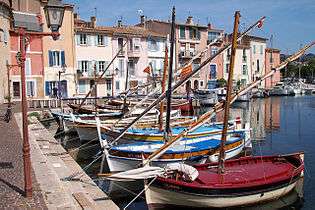Canal de Marseille au Rhône
| Canal de Marseille au Rhône | |
|---|---|
|
Marignane section looking southeast to chaîne de l'Estaque | |
| Specifications | |
| Length | 81 kilometres (50 mi) |
| Status | Closed since 1963 |
| Geography | |
| Direction | Northwest |
| Start point | Marseille |
| End point | Arles |
| Beginning coordinates | 43°21′35″N 5°17′38″E / 43.359717°N 5.293758°ECoordinates: 43°21′35″N 5°17′38″E / 43.359717°N 5.293758°E |
| Connects to | Mediterranean Sea, Rhône |
The Canal de Marseille au Rhône connects the Mediterranean Sea at Marseille to the Rhône at Arles. The section between Marignane and Marseille has been closed since the collapse of the Rove Tunnel in 1963.
Description
The canal has a total length of 81 kilometres (50 mi) from Marseille to Arles.[1] The canal consists of the Rove Tunnel from the harbor on the Mediterranean, the section leading to the Étang de Berre, the Bouc à Martigues canal (or Caronte canal), the Rhône à Fos canal and the Saint-Louis canal.[2] There are two channels at Martigues, the Gallifet canal and the Baussengue canal, used only for recreational boats. Martigues island, between the two canals, is divided by the small canal of Saint-Sébastien, which runs along its length.[2] The complex of waterways at Martigues has led to its being called the "Venice of Provence".[2]
History
The possibility of building a canal with a tunnel through the chaîne de l'Estaque to the northwest of Marseille had been discussed for many years. A proposal was developed for the Marseille Chamber of Commerce in 1879 by the engineer Guérard, but no action was taken until an act of 24 December 1903 authorized the project. The initial plan was for an 18 metres (59 ft) wide tunnel, which would only allow one-way traffic at any time, but this was later increased to 22 metres (72 ft) for two-way traffic despite the increase in cost.[3] Preparatory work began in 1906.[4] On 7 May 1916 Marcel Sembat, Minister of Public Works, and Joseph Thierry, Under-secretary of State for War, inaugurated the Rove Tunnel and the first two cranes of Port-de-Bouc.[5] After many delays, the full canal was finally opened to traffic in April 1927.[6] It was closed in 1963 after a section of the tunnel collapsed.[7]
 1895 plan
1895 plan- Southern portal of the Rove Tunnel
- Railway bridge at Marignane

- Pont du Jaï at la Palunette
See also
References
- ↑ Masson 1916, p. 226.
- 1 2 3 Canal de Marseille au Rhône - Babel.
- ↑ Masson 1916, p. 225.
- ↑ Masson 1916, p. 227.
- ↑ Masson 1916, p. 223.
- ↑ Science: Tunnel – Time 1927.
- ↑ McKnight 2013, p. 243.
| Wikimedia Commons has media related to Canal de Marseille au Rhône. |
Sources
- "Canal de Marseille au Rhône", Histoire & Patrimoine des Rivières & Canaux (in French), retrieved 2016-02-13
- Masson, Paul (15 May 1916), "LE CANAL DE MARSEILLE AU RHÔNE", Annales de Géographie, 25e Année (in French), Armand Colin (135), JSTOR 23439616, (subscription required (help))
- McKnight, Hugh (2013-08-01), Cruising French Waterways, Bloomsbury Publishing, ISBN 978-1-4081-9796-7, retrieved 2016-02-13
- "Science: Tunnel", Time, 2 May 1927, retrieved 2016-02-13